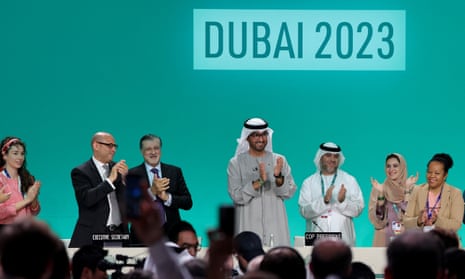Prof Rupert Read, whom I usually admire, has seriously failed to understand the Cop28 agreement (Cop28 leaves highway to climate hell wide open, Letters, 15 December). He claims that the use of the term “energy systems” in the text means that it does not call for a transition away from fossil fuels as a whole.
This ambiguous term is what enabled textual agreement between the 130 countries at Cop28 that wanted a phase-out of fossil fuels and the oil- and gas-producing states who didn’t. The former are absolutely clear that energy systems should be taken to include transport energy – they would not have signed it otherwise. The latter want you to believe it doesn’t. The intended meaning was made clear on the official United Nations framework convention on climate change website when announcing the agreement: “the ‘beginning of the end’ of the fossil fuel era.” It was why the Saudi minister was the only one not applauding at the end.
The Cop28 text is advisory, not mandatory. Its effect on government policy around the world will therefore depend on whether it is understood in political and policy debate to mean a fossil fuel phase-out as a whole or only for electricity and heating. Denouncing it for meaning the latter therefore plays into the hands of the petrostates and those who oppose net zero policies in the UK and elsewhere. It will help to justify, for example, new oil and gas licences in the North Sea.
This is a battle for interpretation. It is vital that all supporters of climate action insist that Cop28 has called for the gradual transition to a non-fossil fuel future. Saying the opposite will be self-fulfilling.
Michael Jacobs
Professor of political economy, University of Sheffield; former energy and climate adviser to Gordon Brown 2004-10
